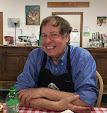Great places to be renewed
I received a great little gift on a recent visit to Red Rooster Coffeeshop in Aberdeen, SD. It came in the form of the hand stamp used to indicate that I'd
paid the cover charge for the evening's concert. The stamp on my hand was the
word "renewed."
Isn't that a terrific message, I thought. Isn't that exactly what's supposed to happen in a coffeeshop. You experience a little community and...you are renewed. That's exactly what I look for when I visit a coffeshop, whether it be in Culver City or Iowa City, Decorah or Dubuque, Oakland or Mineapolis.
Bill's Coffeeshop in Iowa City offers this; so does Uptown Bill's, its crosstown cousin. I've written about other coffeeshops in other cities where I found this spirit; now I'll add Red Rooster to that list. What makes these and other coffeeshops special is the sense of community one finds there.
You can get coffee, even good coffee, lots of places. But you can't get "renewed" at just any coffeeshop. It's something to keep in mind as you travel duing this year.
As you travel, be sure to let us know about coffeeshops where you find a sense of community. We'll pass the word along to other readers so they, too, can be "renewed" as they go from place to place.
Imagining the modern Cupid
What if Cupid were around today? You know Cupid, the chubby little one with the wings who spreads love with a bow and arrow. What would Cupid look like ifhe (or she) were around today? What would he drive (wwcd)? How would Cupid spread the magic of love in our time? Here's your chance to use your imagination. We'd like to hear your ideas.
A large cup of coffee quotes
Coffee on an airplane always smells bad. Whenever it is served, suddenly the whole cabin stinks of it. -- Jonathan Carroll
Almost all of my middle-aged and elderly acquaintances, including me, feel about 25, unless we haven't had our coffee, in which case we feel 107. -- Martha Beck
In my next life, I want to be tall and thin, parallel park and make good coffee. -- Paula Danzinger
Notable coffee, tea and food for thought -- motto of Quotations Coffee (Brevard, NC)
Coffee stains on the flip-down trays mean to the passengers that we do all our engine maintenance wrong. -- Donald Barr
Support counter intelligence -- Sign on a tip jar in a Los Angeles coffeeshop
Thought you'd be interested in these
"America's biggest export: gun violence" is the title of the msot recent issue of First Monday, the online column of Iowans for Prevention of Gun Violence (IPGV). You can read the column and others at the IPGV website: www.ipgv.org.
Kelly Dobson continues a chronicle about his work with homeless individuals in a weblog. His latest entry features Willie in a column titled "A lumbering sort of way." Read his blog at: http://homelessinminnesota.blogspot.com.
Ed Foster is the knight in shining armor for computer users. His recent columns include "Unsettled by the Sony settlement" and "Optout prescreen revisited."Another looks at spyware embedded in many software programs. You can read Ed's Gripe Log at www.gripe2ed.com.
"I'm watching you" is the title of a story about government spying on Iowa peace groups, including members of the Catholic Worker. The story is in the Jan. 12 issue of Cityview, the Des Moines alternative paper. You can read it at: www.dmcityview.com/cover.

